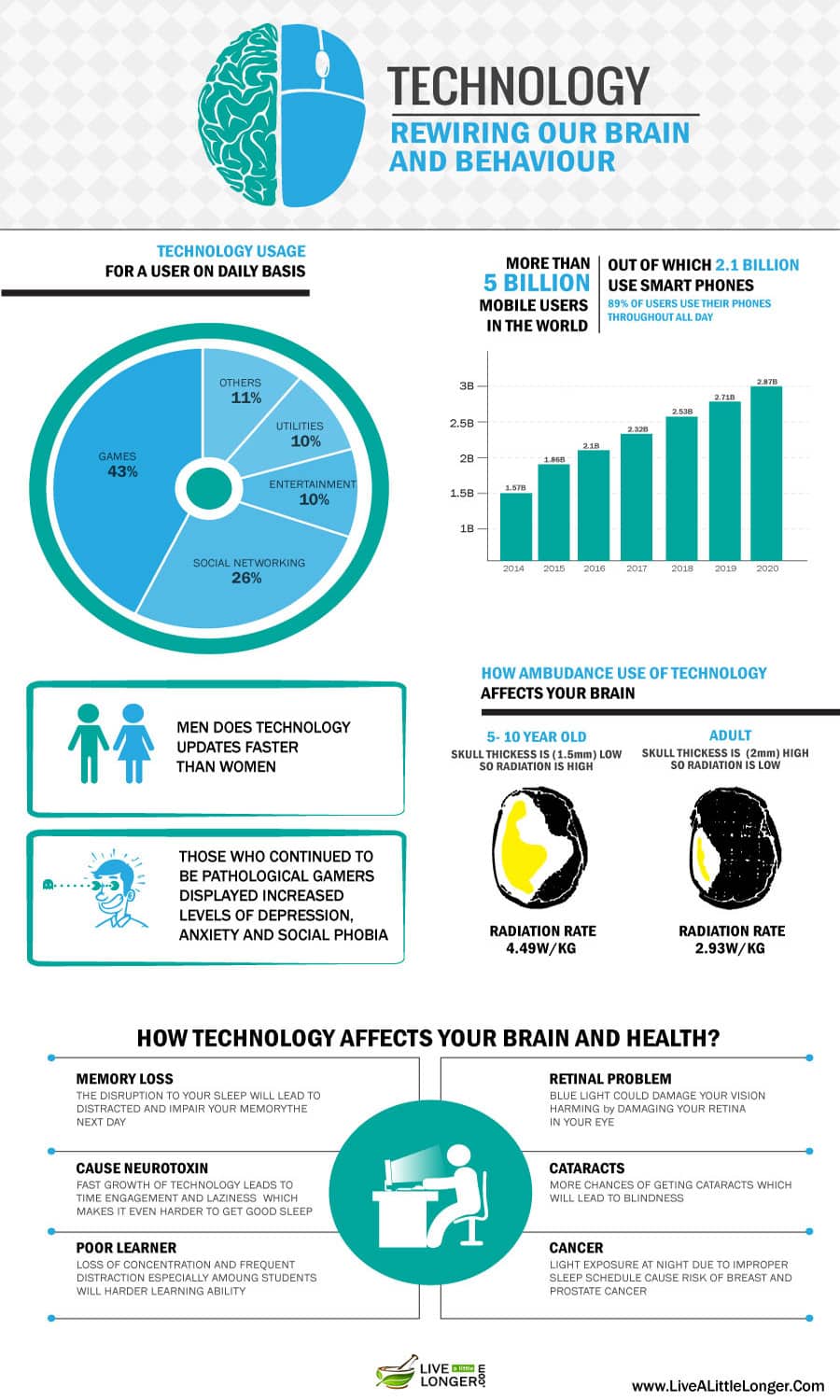When we discuss the growing number of individuals who are highly addicted to technology or gadgets, we think of those smartphone zombies who can hardly keep up a proper conversation. That’s because they are so busy fidgeting their phone notifications, taking selfies, and texting that they fail to enjoy the present situation.
Technology can have a highly bad impact on one’s behavior and life. Hope, you must have heard of some disastrous deaths happening while taking selfies (from great heights) and those terrible car crashes of course! Perhaps, they were too engrossed in peeping at their phones that they never paid attention to their surroundings.
However, the shocking truth is that: these tech junkies are none other than us. According to study reports, most people spend at least 3 hours a day in using tablets and phones (excluding the time we are on the computer).
According to a study carried out by the researchers at the University of Chicago, social media and phones exert a powerful pull on cigarettes and alcohol too. During an international study, with about 1000 students from 12 different universities and colleges, participants who were without their gadgets for 24 hours reported to feel isolated, confused, as well as panicked. They wanted their phones in order to feel comfortable.
Now, just because something is popular or well liked, it doesn’t mean it is bad for all. However, gadgets do have that dark side, which you cannot deny. Hence, we feel that “addiction” is the apt word to define the kind of relationship we share with technology.
Undoubtedly, using technology to the extreme can have a negative impact on both mental as well as physical health. In fact, many people have unplugged from technology and social media — just to rebalance their lives. Nevertheless, their idea of unplugging turns out to be so strict that they freak us out of the entire operation.
Happily, we do not have to be without our phones for the whole 24 hours to reclaim our overall well-being. There are many tiny and simple ways to unplug ourselves every day. We will discuss them at the end of the article, but before that, we would like to throw some light upon the disasters that can happen with your behavior if you are taking technology too seriously.
1. Gives Rise To FOMO (Fear Of Missing Out)
FOMO (or fear of missing out) is the combination of inadequacy, irritation, and anxiety, which can blaze up while skimming through social media. Before when Facebook and Instagram were in our lives, we chose to spend amazing family time. The weekends were quiet, and there was always this face-to-face communication with our dear ones.
But say “thanks” to the social media because those beautiful feelings are now compounded by posts and pictures of raging parties and scrumptious dinners. Even if these activities aren’t your way of enjoying, you will surely know that pang: “I should be doing something interesting on social media right now, just like others.” Well, that’s FOMO. There are even evidence that scrolling through pictures of various friends’ meals on Facebook or Instagram can make your own food taste bland.
2. Lack Of Good Sleep

Many neuroscientists, in fact, doubt that the glowing lights from the screens of laptops, tablets, and smartphones can mess with the body’s inner light cues & sleep-inducing hormones. Also, exposing yourself to brighter lights could actually trick the brain to think that it is still daytime. It can have drastic effects on the circadian rhythms (internal sleep clock).
According to scientists, our eyes are highly sensitive to blue lights emitted by the screens. That’s why it makes it hard for an individual to fall asleep, particularly who already has insomnia.
3. Endless Ways To Procrastinate
Well, Procrastination only leads to “less productivity.” An article published in the Telegraph refers to a UK survey done by a motivational aid website webtrate has found more than 60% of the participants missed their trains while working on social media or emails whereas 36% of the respondents reported that they lost over 2+ hours of productivity every day.
According to a working paper released for the national bureau of economic research by a senior researcher named Scott wallsten analyzed the number of hours people spend online versus the time they give for other day-to-day activities.
His research demonstrated that for each minute of online, there is this “leisure time,” which people spend and that’s about 0.27 seconds on average. We end up working extremely less for a few minutes. This equates to approximately 2.7 minutes of working for 10 minutes that we spend online.
4. Leads To Phantom Vibration Syndrome
Phantom vibration syndrome is a perception or thought that your phone is ringing or vibrating even though it is not. Medical experts have termed this as fauxcellarm or ringxiety. Dr. Michael Rothberg says that this isn’t exactly a syndrome. It is better characterized as tactile hallucinations because the brain imagines something that hasn’t occurred.
According to this 2012 research published in the Journal of Computers & Human Behavior, experts reported that out of the 290 undergraduates, about 89% participants reported having the feelings of “phantom vibrations” once in every 2 weeks. Besides this study, this survey also showed similar results. These are getting more common these days. Since no one is bothered about phantom ringing, the sensations turn out to be an annoyance than an actual physiological problem.
5. Problems With Memorizing Things
 Take a minute and recall the last time you memorized your closed one’s or a random person’s phone number. Probably, must have been the moment when phones weren’t with you. Also, think of the last time you were with your friends having direct conversations and enjoying a dinner party together. Perhaps, last week?
Take a minute and recall the last time you memorized your closed one’s or a random person’s phone number. Probably, must have been the moment when phones weren’t with you. Also, think of the last time you were with your friends having direct conversations and enjoying a dinner party together. Perhaps, last week?
Undeniably, technology alters our lifestyle and the way we study. It also changes the way we utilize our faculties of concentration. In fact, many researchers have claimed that it might have philosophical effects on the memories (especially short-term memory). In some cases, it impairs its function.
6. Information Overload Stops Us From Seeing The “Big” Picture
A professor at the Harvard University (Physics Department) named, John Edward Huth wrote in NY Times that the Internet might have a bigger effect on an individual’s senses and it is very hard for him or her to realize this. He says that burdening with too much information can isolate the information in a way that it cannot fit into a wider cognitive schema.
We frequently atomize the knowledge into sections that we don’t have room for a broader conceptual framework.
7. “Manners & Discipline” Have Vanished
There might be tiny pockets of polite, reasonable people on the internet. However, for most, it is a clammy hellhole that is populated by humans who take unknown joy in stalking, terrorizing, bullying or making it fearful of others. Things, which most people wouldn’t say to a person’s face, are at this time freely bandied. The reason is simple – they are never going to see that person in reality.

8. Poor Impulse Control
According to this 2013 study, video games (for instance, Halo) have the ability to inhibit a player’s capability to cause aggressive or impulsive behavior. Experts have also reported that forcing a player to make sudden decisions, particularly in violent circumstances restrained “proactive executive control.” Besides aggression, video games also cause attention problems.
9. Distraction Makes It Hard To Focus
To make sure that your brain forms stronger memories, you need to be “attentive.” Say, for instance, you are tweeting or texting about a movie, but you might find it hard remembering after some days when someone asks you about it. Forgetting is an apparent sign how busy a person is. When you are not paying attention, memories that your brain forms are not that robust as they should be. This is exactly when we have trouble recalling things.
10. Affects Your Dreams
Well, technology might not haunt our dreams but can make us probably dream in colors. According to this 2008 research carried at the University of Dundee, people who grew up seeing monochrome (black & white) television sets were more possibly to get dreams in grayscale, which are claimed to be truer according to scientists. Today’s generation always dreams in color.


